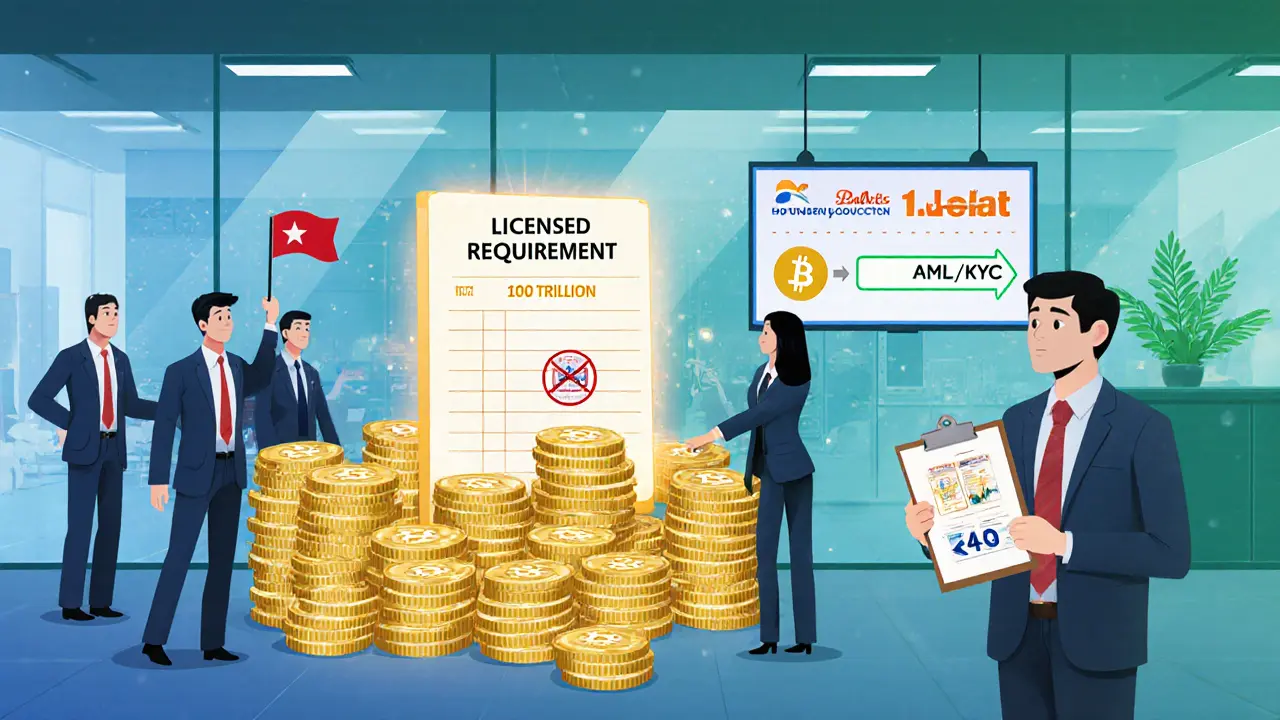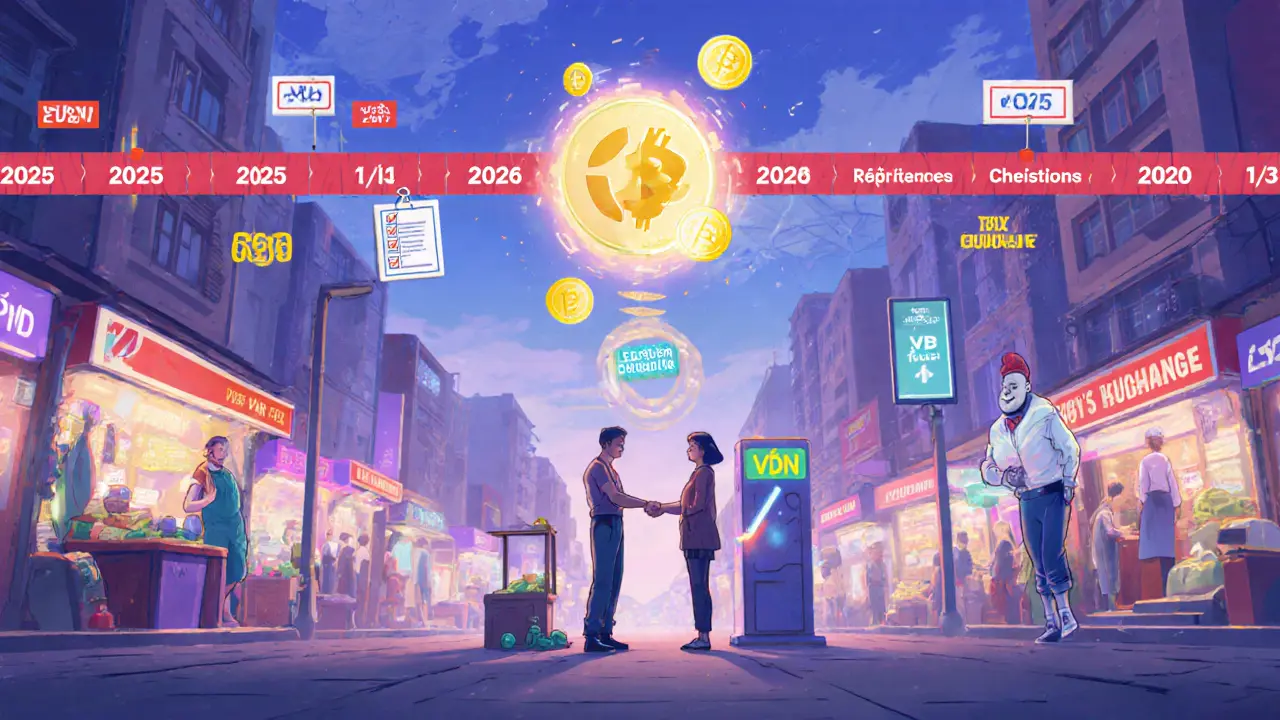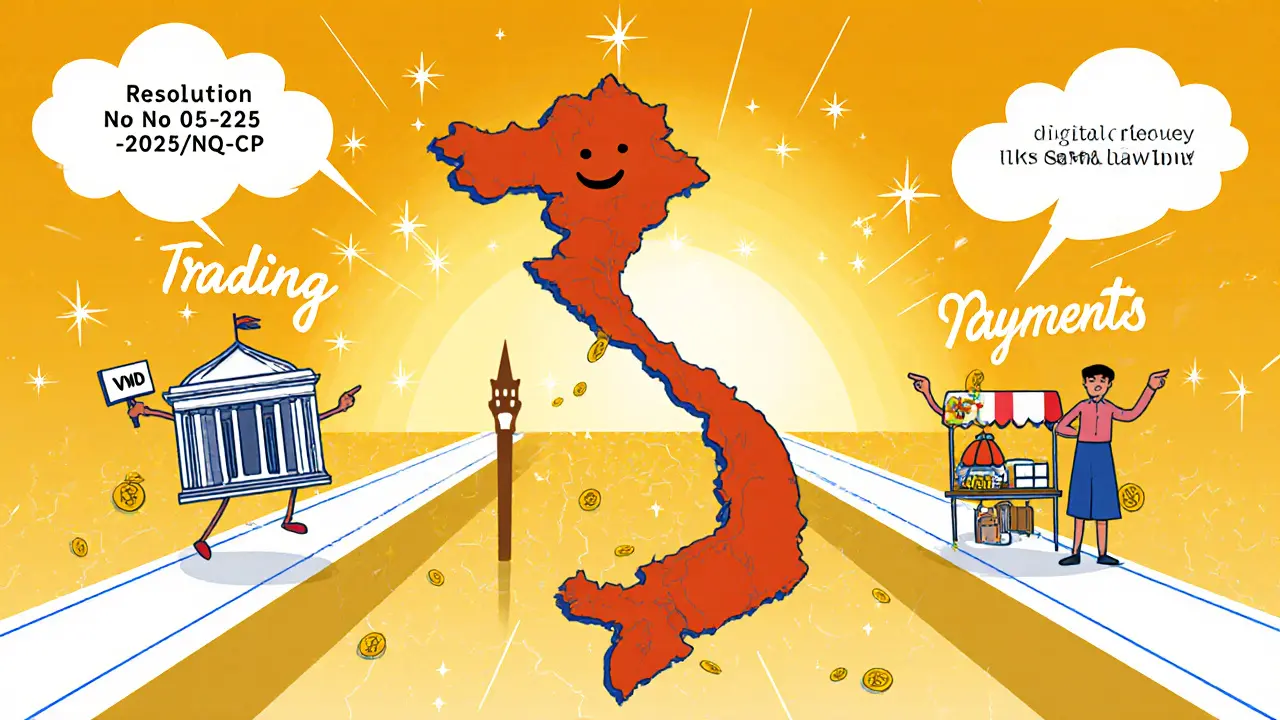Vietnam Crypto Compliance Checker
What is your activity?
Trading Requirements
Payment Requirements
Vietnam’s crypto scene jumped from gray‑area obscurity to a tightly regulated landscape in just a few months. The government’s dual‑track approach treats trading and payment as separate functions, each with its own set of rules. If you’re a trader, a merchant, or simply curious about what you can (or can’t) do with digital assets in Vietnam, this guide breaks down the legal split, the practical steps you’ll need to follow, and the pitfalls to avoid.
Legal Landscape Overview
On Resolution No. 05/2025/NQ-CP is the decree that launched Vietnam’s five‑year crypto pilot, defining how digital assets can be issued, traded, and used for payments was signed on 9 September 2025. It works hand‑in‑hand with the Digital Technology Industry Law the broader statute that officially recognises cryptocurrencies, NFTs and virtual currencies as legal assets, which took effect on 1 January 2026.
The Ministry of Finance (also marked up as a Ministry of Finance primary regulator for all crypto market activities in Vietnam) now issues licences, monitors compliance and enforces anti‑money‑laundering (AML) standards across the sector.
How Trading Is Regulated
Resolution 5 treats crypto trading as a distinct, tightly‑controlled service. The main points are:
- All transactions must be settled in Vietnamese đồng (VND). Direct crypto‑to‑crypto swaps are prohibited; you must convert to VND first.
- Only companies that obtain a crypto exchange licence authorisation required to operate a cryptocurrency trading platform in Vietnam can run an exchange.
- Minimum paid‑in capital is 10 trillion VND (≈ USD 379 million). At least 65 % of that capital must come from institutional investors.
- Foreign ownership is capped at 49 %, ensuring domestic control over the exchange infrastructure.
- Licensed exchanges must implement AML/KYC procedures that meet international standards, and they must report any suspicious activity to the Ministry of Finance.
- Crypto assets traded on licensed platforms must be “backed by real underlying assets” - fiat, securities, or other regulated instruments are excluded.
Licensing begins after 1 January 2026, with a six‑month grace period for existing users to migrate. Operating without a licence after that window is considered illegal and can lead to administrative fines or criminal prosecution.
How Payment Use Cases Are Treated
Resolution 5 also creates a separate category for “payment of crypto assets”, but the rules are less fleshed out:
- The VND‑only transaction rule still applies, meaning a merchant must convert crypto to VND before completing a sale.
- There is currently no detailed guidance on whether peer‑to‑peer crypto payments, remittances, or in‑app purchases are allowed outside licensed exchanges.
- The Ministry of Finance is expected to release a dedicated payment‑use‑case directive before the law’s full launch, covering tax treatment, invoicing requirements, and reporting thresholds.
- Until that guidance arrives, many businesses treat crypto‑payment activities as high‑risk and prefer to stick with traditional fiat channels.
In short, while trading has a concrete licensing path, payment remains a gray zone that will likely tighten once the pending directives are published.

Regulatory Comparison: Trading vs Payment
| Aspect | Trading (Exchange) | Payment (Merchant/Consumer) |
|---|---|---|
| Legal basis | Resolution No. 05/2025/NQ‑CP | Resolution No. 05/2025/NQ‑CP (payment clause) |
| Licensing | Crypto exchange licence required | No specific licence yet (pending Ministry guidance) |
| Capital requirement | 10 trillion VND, 65 % institutional | None defined currently |
| Foreign ownership limit | 49 % | Not applicable |
| Transaction currency | Must settle in VND (crypto‑to‑VND conversion) | Must settle in VND; direct crypto‑to‑crypto payments unclear |
| AML/KYC | Mandatory, regulated by Ministry of Finance | Expected once payment rules are issued |
| Penalty for non‑compliance | Administrative fines or criminal charges after grace period | Potential fines; exact penalties pending |
Practical Implications for Users and Businesses
What does this mean on the ground? Below are actionable steps for the two main audiences.
For Individual Traders
- Choose a platform that has secured a crypto exchange licence. As of October 2025, only a handful of Vietnamese firms have announced they will apply.
- Convert any crypto you hold to VND before the six‑month deadline (mid‑2026). Keep transaction records for future AML reporting.
- Expect higher fees on licensed exchanges because of the massive capital requirement and compliance costs.
- Stay tuned to the Ministry of Finance’s tax circulars - capital gains, staking rewards and NFT sales may become taxable once guidance is released.
For Merchants Wanting to Accept Crypto
- Until payment rules are clarified, use a licensed exchange as an intermediary: accept crypto, immediately convert to VND on the same platform, then deposit the VND into your bank account.
- Implement robust KYC for customers, mirroring exchange standards, to future‑proof your operation against upcoming payment‑specific regulations.
- Document the conversion step (crypto → VND) for each transaction. This will become essential for audit trails once tax rules arrive.
- Consider alternative stablecoins that are pegged to VND and classified as “crypto assets” - they may enjoy easier conversion pathways under the VND‑settlement rule.

Risks and Penalties
Non‑compliance can carry serious consequences. Operating an exchange without a licence after the grace period can incur fines up to 10 % of annual turnover or even imprisonment for repeat offenders. For payment activities, although penalties are not yet codified, the Ministry has signalled a “zero‑tolerance” stance on AML breaches, meaning businesses should treat any unregulated crypto‑payment workflow as high‑risk.
Outlook and Next Steps
The five‑year pilot (2025‑2030) gives the government room to tweak requirements. Analysts expect the following trends:
- More detailed payment‑use‑case guidance by mid‑2026, likely covering tax rates, invoicing and cross‑border remittances.
- Potential softening of the capital floor if only a few domestic players qualify - the state may introduce tiered licences for smaller operators.
- Increased collaboration with ASEAN neighbours to harmonise AML standards, which could open pathways for cross‑border crypto trading hubs.
For now, the safest bet is to align with the current licensing model for trading and treat any payment activity as a temporary bridge through licensed exchanges. Keep an eye on Ministry releases - they will shape the final shape of Vietnam’s crypto ecosystem.
Do I need a licence to trade crypto in Vietnam?
Yes. After 1 January 2026, only platforms that have obtained a crypto exchange licence from the Ministry of Finance can legally operate. Individual traders must use those licensed platforms.
Can I use crypto to pay for goods directly?
The current rule mandates that every crypto transaction be settled in VND. Until the Ministry issues specific payment guidance, merchants should convert crypto to VND on a licensed exchange before completing a sale.
What happens if I keep using an unlicensed exchange after the grace period?
Continuing to trade on an unlicensed platform is illegal and can lead to administrative fines of up to 10 % of yearly revenue or criminal prosecution for repeat violations.
Are stablecoins allowed for payment?
Stablecoins classified as crypto assets are permitted, but they must still be converted to VND for settlement under the current VND‑only rule.
When will tax rules for crypto be published?
The Ministry of Finance has pledged to release detailed tax guidance before the full law takes effect on 1 January 2026, but exact dates are still pending.

20 Comments
Ray Dalton
Big picture: Vietnam’s move to require VND settlement is actually smart. It keeps crypto from destabilizing the currency while letting innovation happen under guard. The 10T VND capital requirement is insane for small players, but it filters out sketchy operators. If you’re trading, stick to licensed exchanges - no point risking your assets.
MANGESH NEEL
Of course the state wants control. Crypto is freedom and freedom is chaos. They’re scared. They’ll regulate everything until there’s nothing left to trade. This isn’t innovation - it’s a funeral with paperwork.
Peter Brask
They say ‘backed by real assets’ but what’s ‘real’? Gold? USD? The Fed? 😏 Wake up. All money is a lie. This whole system is a pyramid with a Vietnamese flag on top. They’re just trying to monetize the panic.
Melodye Drake
Let’s be real - if you’re a merchant trying to accept crypto, you’re either a martyr or a fool. No one’s going to risk their business on vague ‘pending guidance.’ I’d rather take PayPal fees than deal with this.
Patrick De Leon
Irrelevant. The EU and US are still fumbling. Vietnam at least has a plan. Capital requirements? Good. Foreign ownership caps? Necessary. This isn’t crypto libertarianism - it’s nation-building. You either adapt or get left behind.
DINESH YADAV
India already banned crypto. Vietnam is playing chess while you’re playing checkers. If you can’t handle rules, don’t play. This is how real economies protect their people.
Kyle Waitkunas
DO YOU REALIZE WHAT THIS MEANS?!?!?! They’re not just regulating - they’re ERASING privacy! Every single transaction tracked! Every swap monitored! The Ministry of Finance is becoming the new NSA with better suits and worse ethics! They’re building a surveillance state using blockchain as the leash!!
Marlie Ledesma
It’s actually kind of impressive how structured this is. Most countries just ban it or ignore it. Vietnam’s trying to build something sustainable. I’m curious how the tax rules turn out - hope they’re fair.
Paul Kotze
Interesting model. VND-only settlement makes sense for monetary stability. But what about remittances? If someone in the US sends crypto to family in Vietnam, do they have to convert it on an exchange first? That’s gonna be a nightmare for daily users.
Sean Hawkins
For merchants: using licensed exchanges as intermediaries is the only viable path. It adds a layer of compliance and auditability. The KYC you implement now will save you from future penalties. Treat this like PCI-DSS for crypto - proactive compliance is cheaper than reactive fines.
Daisy Family
so like… uhh… we’re supposed to just… trust the government now? 😐
harrison houghton
There is a deeper philosophical tension here. The state claims to recognize crypto as an asset - yet demands its conversion into fiat. This is not regulation. It is ontological contradiction. Crypto exists to escape central control. By forcing VND settlement, they negate its essence. They are not governing - they are colonizing digital space.
Sean Huang
They say 'backed by real assets' but what if the 'real assets' are just government bonds? That’s not backing - that’s rehypothecation. This whole thing is a front for the Fed to control global crypto flows through Vietnam. They’re using ASEAN as a puppet. Wake up.
Chris Pratt
As someone who’s worked with remittance platforms in Asia - this VND-only rule is actually genius for financial inclusion. It keeps crypto from becoming a parallel economy. People still get value, but the system stays stable. Respect.
Susan Bari
10 trillion VND capital? That’s not a licensing requirement - it’s a barrier to entry for anyone who isn’t already connected to the Party elite. This isn’t innovation. It’s state capture dressed in blockchain.
paul boland
LOL the US is still arguing if crypto is a commodity or currency and Vietnam just built a whole damn framework. We’re the ones with the memes - they’re the ones with the laws. 🇻🇳🔥
Trent Mercer
So… we’re supposed to care about this? I mean, who even trades crypto in Vietnam? And why does anyone care if it’s settled in VND? It’s not like I’m moving there.
vonley smith
Don’t overcomplicate it. If you’re trading - use a licensed exchange. If you’re paying - convert to VND first. Stay low, keep records, wait for the tax rules. You don’t need to be a hero. Just be smart.
Jason Roland
It’s not perfect, but this is the most coherent crypto policy I’ve seen from any emerging economy. The fact they’re leaving payment rules open for now is actually strategic - lets the market adapt. I’d bet on Vietnam becoming the ASEAN crypto hub if they keep this pace.
rachel terry
Why are we even pretending this is about innovation? It’s about control. They want to tax everything. They want to know who you are. They want to stop you from leaving. Crypto was supposed to be the escape hatch. Now it’s just another bank account with extra steps.